22 Sep 2012
Day four at the Degrowth conference in Venice: “Democracy without confidence is nothing”
The theme of Saturday, my last day at Degrowth2012 (although it is continuing tomorrow also) was ‘democracy’. I arrived late for the opening session, due to having been woken several times in the night by a very persistent mosquito, and after I had lovingly posted my write-up of yesterday, for you dear reader, I was running a little bit late. So I missed Marco Deriu, and arrived half way through the talk by Salvor Nordal, Chair of the Iceland Constitutional Council and the University of Iceland. She had been speaking about how the financial crash of 4 years ago in Iceland has led to a very creative process of reimagining democracy in Iceland.
It led to the setting up of various commissions, one that looked into what happened in the banking crisis, and another, which she was part of, which explored the ethics and morality of what occurred. In the end, the final report, with the reports of the various commissions, ran to 9 volumes.
This in turn led to a revision of the constitution which has been unchanged since it was created in 1874. A national forum of 950 people was brought together, picked at random from the Electoral Register. A committee of experts then collated this into a report. Then a constitutional council, consisting of 25 citizens from very diverse backgrounds and not representing political parties set out to report to government, and consulted the public as much as possible.
What emerged was the need to strengthen democracy, increase transparency and direct democracy. 10% of the population can now demand a referendum. The council’s proposal was handed to the government in 2011, following what she described as a unique process that embodied a very powerful process. Its drawbacks have been that the role of the committee and the forum were not very well designed, it wasn’t clear what would happen afterwards, and the politicians have been reluctant, there is no consensus what to do next. It is hoped that next year there will be a referendum on the proposal.
Her conclusion was that the crisis has generated investigations and broad discussion about Icelanding business, government and culture, that still is discussion and investigation of the past event, that revision of the constitution is an attempt to look forward, that Iceland is moving towards a more open society.
The next speaker was Alfredo Pena-Vega, a sociologist from the Institut International de Recherche, who is a specialist in complexity theory. We all want change, he began, dramatic change, a bright new paradigm. But that will require a new cognitive structure, a theory of complexity, a science of complexity. The word democracy has been used so much that it has lost much of its meaning. We discuss it, but don’t know what we are talking about. We love democracy, many have fought for it on our behalf, but we don’t know how to re-fascinated, re-enchant it.
If we are going through a crisis of democracy, it is a crisis of politics as well. Politics has got lost. Why? It is not equipped for a world of uncertainty. We cannot discuss what to do without also discussing uncertainty. But how did we get here? The uncontrolled development of industrial civilisation has impacted the biosphere and out lives. It has led to the disintegration of social solidarity as we knew it. Between elections there is no engagement, and when there are elections turn-out is very low.
We need a new concept of politics that goes beyond development. We have two options for the future. One is to rush into disaster. The second is to approach change. We are approaching a metamorphosis, for Degrowth this means that the challenges we are facing are intertwined and we have to prioritise our responses. On the one hand we are a society of needs, on the other a society of desires. We must come up with a version of transition that will be accepted also by our enemies. We have to have a transition with a high degree of acceptability. We have a long winding road ahead, and it is up to us whether we have a politics of hope, or a politics of fear.
The last speaker of the session was Marco Revelli a historian and political scientist from University of Piemonte. He started by stating that democracy has allowed us to make a lot of mistakes but we can’t carry on making those kinds of mistakes. We have to recognise limits. Democracy emerged as an idea in societies that considered themselves limitless.
So what happens to democracy in a capitalist society which is growing economically? Growth has become an exponential explosion of wealth. How does democracy fare in that context? Actually it is on the verge of collapse. We have ended up with a ‘people-less’ democracy, and democracy without confidence is nothing. This affects Italy most severerly. After the recent referendum on the privatisation of the nation’s water industry (where the people rejected the proposal) there was a simple poll conducted. Only 18% of those polled felt the government were doing well. In terms of the opposition, 83% felt they were doing badly too. So, around 90% of people don’t recognise themselves in either the government or the opposition.
Another poll found confidence in parliament somewhere between 8.5% and 11%. Italy is a parliamentary democracy, yet only 1 out of every 10 people trusts the government. In the West we hear about indifference to democracy in many places. In Spain 70% of people don’t trust the government, in Germany it’s 84%. This is not a safe situation. Why? The behaviour of politicians is to blame, but politicians have also lost a lot of power as they are overwhelmed by financial and corporate power, they have been deprived of power. Social media also now means that often the electorate are better informed than the politicians. Also, we are now in a time where the greater the amount of electoral fund money you have, the more likely you are to win. In the last America election, the combined amount spent by the two candidates topped $1bn for the first time. This applies to all countries though, whoever raises the most generally gets in.
This means that the current system lacks legitimacy. The modern economy is a ‘homeless economy’, it is abstract, it is without foundations. So where do we find democracy? People tend to give up when they feel powerless, and tend to focus on ‘surveillance mechanisms’ to hold politicians to account. This, driven by anger, is a self-devouring mechanism. We need new networked policies of resistance, defused relational structures, and ability to co-exist well. Resistance from the grassroots can foster the emergence of a counter-democracy.
After the coffee break I did an interview with Silke Helfrich, which I will post here soon, and then after lunch went to a talk by Mary Mooney, an economist at the University of Northumbria about money, which was very interesting. I did take some notes, but she told me that Transition Newcastle have filmed four lectures of hers about different aspects of money which will be online at the end of this month, so I will let you know when they emerge.
The final session, for me, really brought into focus the serious limitations of the ‘4 speakers on a stage for 2 hours, no questions’ format. The first, Alicia Puelo, an ecofeminist philosopher, stated that she was concerned that the shift into degrowth had the potential to undo much of the good work done by feminism, what she termed “a patriarchal counter-reformation”. She talked about what feminism is, describing it, which I rather liked, as “machismo, but for women”.
It has taken thousands of years to get where we are today, a nearly equal society, but that is very fragile. She is concerned that discussions around population can end up being counter to feminism. There are places where feminism overlaps with Degrowth, such as an end to advertising, and the aim to free people from consumption. She lost me a bit when she said “women are committed to the cause of animals”, which struck me as a rather sweeping generalisation … there must surely be some women who can’t stand them.
Anyway, next was Antonio di Luca (above, right), who used to work at the Fiat factory as a metal worker and who is a trade unionist. He talked about the situation in the south of Italy, where most of the heavy industry is closing down. In the south, he said, we are on the verge of a tragedy, with 20% unemployment, 52% for women. Young people are leaving. He talked about how the factory was like a village, it was the social hub, it was the community. We must prevent the exploitation of men by men. He argued for a coalition of the Left to really stand up for those who are being left behind.
The last speaker was Majid Rahema, a Professor at Claremont University, who rambled all over the place and from whose talk, I must confess, I failed to glean anything other than that I really wanted to be out in the evening air taking in this fine city for my last night here. So I did. Now I must prepare some slides for the talk I am giving in Parma on Monday. Tomorrow I am going on a boat trip to Ferrara with members of various Italian Transition groups which will be fun.
On my way home I will write some thoughts from Degrowth2012 in terms of what Transition can learn from Degrowth and what Degrowth can learn from Transition. It has certainly been a fascinating few days, and I feel really honoured to have been here and to have met so many great people. I hope this documenting of the event has been useful to you, and that you have managed to make sense of my notes and of my reflections. This is Rob Hopkins, your Transition Network Degrowth 2012 correspondent, signing out….
Before I go though, here is a bit from Italian TV about the launch night on Wednesday, in which I make a fleeting appearance:
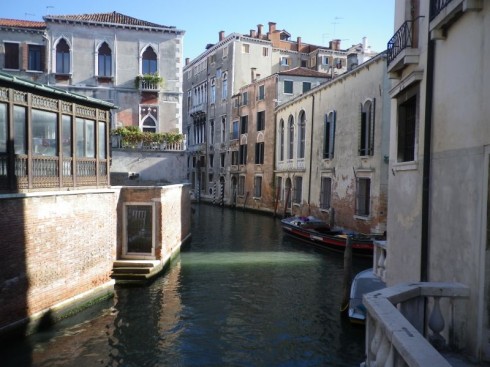
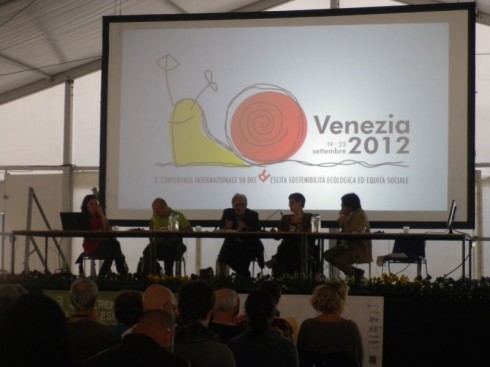
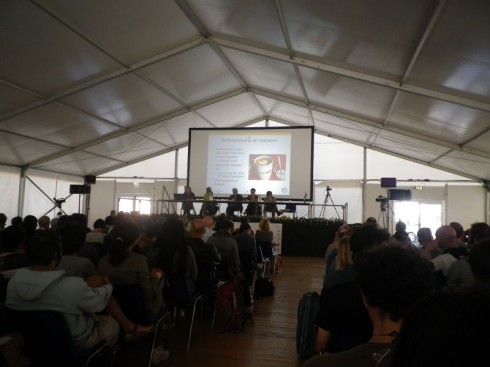
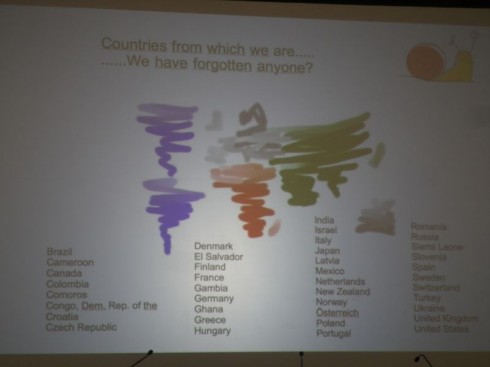

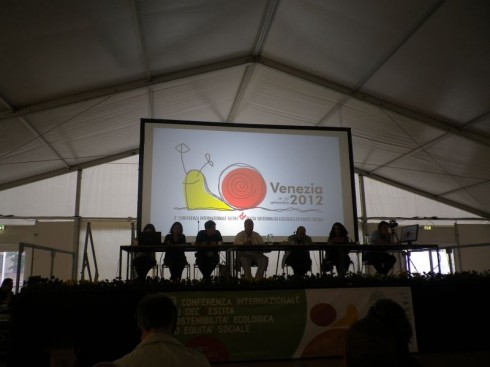
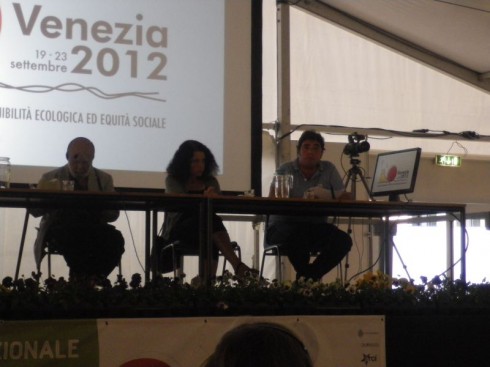
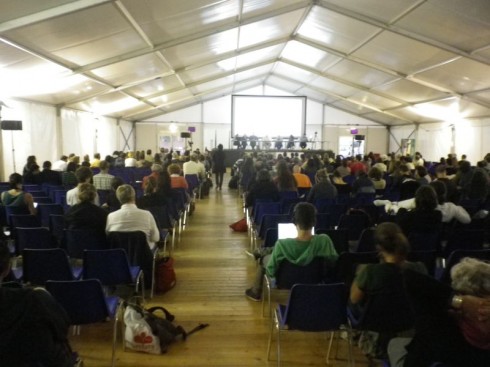
Frederick Malouf
23 Sep 3:21am
Hi,
Great writeup. God I wish I was there. There are so many things happening.
I am involved with Transition Bondi in Australia (transitionbondi.org) and am researching money structures for the greatest sense of equality and creativity. I searched Mary Mooney, but can’t find anything. Could you please send me a link or contact for her, so I can see what she said about money?
Looking forward to the links you will have on her talks, too. 🙂
Kindest regards,
Frederick
Bondi Locals
Bondi 88FM
Rob Hopkins
23 Sep 7:05am
Hi Frederick,
I will post her films here when they become available.
Best wishes
Rob
Wynn Williamson
23 Sep 8:42am
Yes, thanks Rob for the great, detailed write-ups! Hope to make it next year!
Tony Buck
24 Sep 3:27pm
Rob, this is a great service to everyone and I really thank you for taking the time to think of us out here on the perimeter. P.S. in summer always travel with a mosquito net!
Caroline Walker
25 Sep 10:28am
Thank you for your painstaking work in posting these reports and for the lovely photos.
Elisabeth Winkler
25 Sep 3:57pm
Thanks for write-up, Rob.
Very informative.
Hopeful about Iceland…
Trugs
25 Sep 5:07pm
Excellent reporting as usual from you Rob. It’s a shame that transition techniques for engaging everyone in the room were not used more often at this event, but I’m also struck by the extent of continuing 20th century left/right dialectic.
In Transition we might think that we have accepted that the future means fewer resources and less material stuff, but many of us still find it incredibly difficult to accept “less” while others still appear to have “more”. We allow politics of envy to consume us and fight “austerity” instead of being confident enough in our own new vision to say “even if those who have more stuff/money redistributed it more fairly, we don’t want it”.
Could we be confident that the things we can create in our Transition communities – joys of fellowship, collaboration etc, are worth more than money ? Can we create something that the “rich” envy and want to be part of ? Can we pity the rich ? Would that change the world ?
Joe Peschi
25 Sep 8:27pm
This whole degrowth thing, just as other global sustainability innitiatives such as Kyoto make about as much sense as asking a town’s citizens to voluntarily build and upkeep the town’s entire sidewalk infrastructure (a public good). There is a reason we do not do things that way when it comes to municipal governance, so why do people advocate that we do this for global sustainability? It is a shame that such ideas gather so much suport, while anything that actually makes some common sense is brushed aside. I recomend people read “Sustainable Trade” by Zoltan Ban, which is basically a proposal to push for a standardized global tariff designed to encourage sustainability, perhaps then you will understand why these innitiatives will never get us anywhere, and perhaps you will come to apreciate a common sense solution for a change, even if it does not satisfy one’s thirst for ideological fulfilment.
Frederick Malouf
25 Sep 11:47pm
Seriously, whatever tax of tariff or whatever charge you want to put on business to change things does not handle the core problem, and that is the structure of money. Change how money works, take out usury, and watch how things change. Does that mean an end to banks as we know them? Of course, but so what? People have proven to be more prosperous and sustainable, and loving life much more, when they use alternate currencies for trading their product and service with each other. The overbearing cost that stops people from applying innovation is interest. Why? Has anyone wondered why a bank has the authority to give money? Does anyone know that without debt, the current GLOBAL monetary system would crash?
Any extra cost built into the current monetary system would be useless without looking at the final picture, and that has to be to take out usury. And if you are worried about the wealth lost, thin what that ‘wealth’, as you want to call it, really is right now. Think about what you could really buy, and how things will be created and valued in a no-cost currency world.
I did not say take out money!!! Although, there are models for that, too, but to understand money and its true value is a great way forward.
Frederick Malouf
25 Sep 11:48pm
And Rob, you are awesome! I hope to meet you in Sydney sometime.
michael Dunwell
26 Sep 6:45pm
Frederick Malouf.. I’m sure Rob meant Mary Mellor, not Mooney.
Rob Hopkins
26 Sep 8:45pm
Ah yes, that’s her. Oops. Thanks Michael. Sorry Mary.